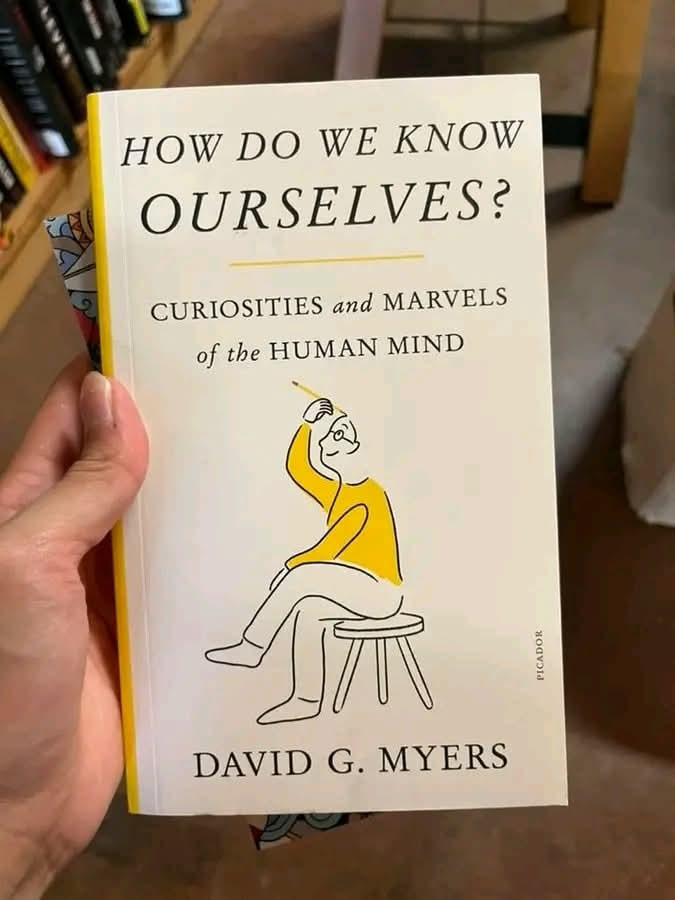Myers discusses a variety of themes, including the role of social influences, the impact of culture, and the evolution of self-perception. He highlights the fascinating phenomena of cognitive biases, memory distortions, and the ways in which our brains process information. Moreover, the book delves into the interplay between nature and nurture, illustrating how genetics and environment shape our identities and experiences. Myers emphasizes the importance of curiosity and self-reflection as tools for personal growth, encouraging readers to question their assumptions and explore the depths of their consciousness. Ultimately, "How Do We Know Ourselves?" serves as both a celebration of the human mind's marvels and a guide for individuals seeking to deepen their understanding of themselves and the complexities of human behavior.
Here are 10 lessons :
1. The Complexity of Self-Identity
One of the primary lessons in Myers' book is the complexity of self-identity. He illustrates how our sense of self is not a singular entity but a multifaceted construct influenced by various factors such as culture, environment, and personal experiences. Myers encourages readers to reflect on the different aspects of their identities, including social roles, beliefs, and values. This understanding can lead to greater self-awareness and appreciation for the diverse influences that shape who we are.
2. The Power of Memory
Myers highlights the fallibility of memory, emphasizing that our recollections are not always accurate representations of reality. He discusses how memories can be altered by external influences, biases, and the passage of time. This lesson serves as a reminder for readers to approach their memories with a critical eye and to recognize that our past experiences may be reconstructed rather than perfectly preserved. Understanding the malleable nature of memory can lead to more compassionate self-reflection and interpersonal understanding.
3. The Influence of Social Context
The book underscores the significant impact of social context on behavior and self-perception. Myers explores how our interactions with others, societal norms, and cultural backgrounds shape our thoughts and actions. This lesson encourages readers to consider the role of their social environments in influencing their identities and motivations. By recognizing these influences, individuals can make more conscious choices about how they engage with the world and the people around them.
4. Cognitive Biases and Decision-Making
Myers delves into the world of cognitive biases, illustrating how our minds can play tricks on us when making decisions. He explains various biases, such as confirmation bias and the availability heuristic, which can distort our perceptions and judgments. This lesson urges readers to be aware of these biases and to adopt critical thinking strategies when evaluating information and making choices. By doing so, individuals can enhance their decision-making skills and cultivate a more accurate understanding of reality.
5. The Role of Emotions in Self-Understanding
In "How Do We Know Ourselves?", Myers emphasizes the integral role of emotions in shaping our self-understanding. He explains how our feelings can influence our perceptions, decisions, and interactions with others. This lesson highlights the importance of emotional awareness and regulation in fostering better relationships and self-acceptance. By recognizing the interplay between emotions and self-concept, individuals can cultivate emotional intelligence and improve their overall well-being.
6. The Interconnectedness of Mind and Body
Myers discusses the profound interconnectedness of mind and body, illustrating how physical health can significantly impact mental well-being and vice versa. He emphasizes the importance of maintaining a healthy lifestyle, including proper nutrition, exercise, and sleep, as essential components of mental clarity and emotional stability. This lesson serves as a reminder that taking care of one’s physical health is fundamental to achieving a balanced and fulfilling life.
7. The Importance of Curiosity
A central theme in Myers’ work is the value of curiosity as a driving force for self-discovery and personal growth. He encourages readers to maintain a curious mindset, asking questions and seeking knowledge about themselves and the world. This lesson promotes lifelong learning and exploration, allowing individuals to expand their perspectives and deepen their understanding of their thoughts, feelings, and behaviors.
8. The Influence of Culture
Myers explores the profound impact of culture on our self-perception and behavior. He discusses how cultural norms, values, and beliefs shape our identities and influence our interactions with others. This lesson encourages readers to examine their cultural backgrounds and consider how they inform their views of the world. Understanding cultural influences can foster greater empathy and appreciation for diversity in human experiences.
9. The Nature of Consciousness
In the book, Myers delves into the nature of consciousness, prompting readers to consider what it means to be self-aware. He discusses the various levels of consciousness, including the subconscious and conscious mind, and how these aspects contribute to our understanding of ourselves. This exploration encourages individuals to reflect on their thought processes and engage in mindfulness practices to enhance their self-awareness and mental clarity.
10. The Journey of Self-Discovery
Finally, Myers emphasizes that self-discovery is a lifelong journey. He encourages readers to embrace the process of exploring their identities, understanding their motivations, and learning from their experiences. This lesson serves as an invitation to approach life with openness and a willingness to adapt as new insights and experiences arise. By recognizing that self-understanding is an ongoing endeavor, individuals can cultivate resilience and a deeper sense of fulfillment in their lives.
BOOK: https://amzn.to/4jmtggn
You can also get the audio book for FREE using the same link. Use the link to register for the audio book on Audible and start enjoying it.


No comments:
Post a Comment